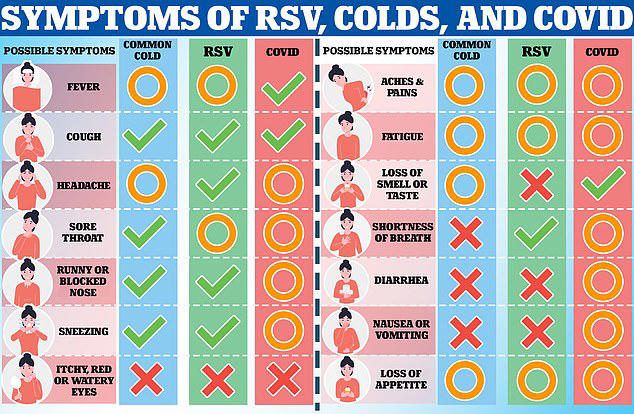The Medicines and Healthcare products Regulatory Agency (MHRA) issued the alert for two versions of a jab that protects against respiratory syncytial virus (RSV).
This alert was issued after reports of 21 patients—all over 60—developing Guillain-Barré syndrome after being vaccinated.
Guillain-Barré syndrome is a rare but serious neurological disorder which needs urgent treatment in hospital to prevent it progressing.
It can affect people's senses, movement, breathing and heartbeat and usual starts in the arms and legs before spreading to other areas.
The alert doesn't mean the jab has been withdrawn, just that staff need to inform patients of the link so any who develop the reaction get the help they need as soon as possible.
In fact, experts said the benefits of being protected against RSV, which kills 8,000 adults and 100 babies each year and hospitalises many more, outweighs the small risk of Guillain-Barre syndrome, so it is still recommended to get it if offered.
The MHRA issued the alert for both the Abrysvo RSV jab—made by Pfizer of Covid vaccine fame—and another RSV jab called Arexvy, made by GSK.
Abrysvo is available in the NHS while latter is available privately.
The MHRA alert reads: 'Healthcare professionals should advise all recipients of Abrysvo and Arexvy that they should be alert to signs and symptoms of Guillain-Barré syndrome and, if they occur, to seek immediate medical attention as it requires urgent treatment in hospital.'
While warnings that the jab may cause the syndrome are included in patient safety information leaflets NHS staff will now have to warn patients directly.
The watchdog's warning follows a similar one issued by US health chiefs who in January.
Like UK experts, American officials also said while awareness of the risk of Guillain-Barré syndrome was important taking jab if eligible was still recommended.
Symptoms of Guillain-Barré syndrome can include tingling, numbness or pins and needles in feet and hands, muscle weakness and difficulty moving joints.
There may also be problems breathing and drooping face muscles or trouble swallowing or speaking.
Up to June 2, the MHRA has received 21 Yellow Card reports of suspected Guillain-Barré syndrome in older adults, aged 75-79 where known, after they were given an Abrysvo vaccine.
This out of almost 2million doses of Abrysvo administered, it said.
The MHRA has not received any Yellow Card reports of Guillain-Barré syndrome following Arexvy, however it noted there has been very limited use of this vaccine in the UK to date.
The 'Yellow Card' scheme allows officials to track potential adverse reactions to medications approved for use in the UK and spot emerging patterns.
Can You Live Off a $1M+ Portfolio in Retirement? Try Our Retirement Calculator
Ad
Can You Live Off a $1M+ Portfolio in Retirement? Try Our Retirement Calculator
Fisher Investments
Learn more
call to action icon
Every drug approved for use in Britain has to go through safety trials before being made available to the public.
But there is an unavoidable risk that rare reactions may have been missed, which is where the Yellow Card system comes in.
If a worrying pattern emerges it can lead to drugs' approval being reviewed, having new warnings added to the labels or the medication potentially being taken off the market completely.
As anyone can use the system—patients as well as their medics—a reaction being linked to a vaccine or drug is not proof it was responsible.
The MHRA highlights that some reactions may simply be coincidence.

For example, a patient given an RSV jab may develop Guillain-Barre syndrome, but the vaccine itself may not be responsible.
Guillain-Barré syndrome is a poorly understood condition.
It occurs when the body's immune system, which normally protects people from infection, mistakenly attacks healthy nerve cells.
While most patients recover within a year, some are left with permanent nerve damage.
What triggers the immune system to attack nerve cells in Guillain-Barré syndrome isn't understood.
But, as the syndrome can also occur following an infection with a virus or bacteria, some experts suspect it's caused by a misfiring of the immune system in response to a foreign substance, be that a pathogen or a vaccine.
Such reactions, from both infections or RSV vaccines, are rare, with the risk estimated to be about one in every 1,000.
RSV vaccines, which were only approved in the UK last year, offer protection to older adults and babies who are at increased risk of becoming seriously ill if infected.
The virus can cause dangerous breathing problems in babies as well as pneumonia in older people, both of which may require hospital stays.
RSV jabs are offered to pregnant women so that the protection passes to the developing baby, reducing their risk of severe infection by about 70 per cent.
Government data shows that 62 per cent of eligible older adults and about half of pregnant offered the RSV vaccine on the NHS in England had the jab.
The latest NHS data—for the 2023-2024 financial year—recorded about 3,000 admissions for Guillain-Barré syndrome in England's hospitals though some cases could be the same patient needing to admitted multiple times that year.
Guillain-Barré syndrome is more common among adults and men for reasons scientists are still investigating.
